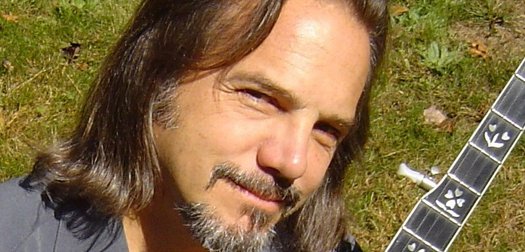|
|
|
|
 |
||
|
|
|
Jennifer: It's crazy. And then another guy who did the same thing and just posted it on his Facebook or whatever and said‚ "Send me your auditions." The thing we're trying to figure out how to do is put together some kind of continuous feed for our viewers or fans to be able to go from the culmination of the week ending in a performance leading up to that‚ and telling the story of how that happens. You know‚ people just don't call up and say‚ "We really hope you'll play Carnegie Hall for us tonight." I think people would be interested in that‚ in addition to developing Vermont's music.
What else do you think about that instrument‚ the pedal steel‚ the expressiveness of it?
Gordon: It's a very overlooked instrument‚ not a lot of people play it. You have to build it every time you play it. Some assembly required. [laughter]
It's not the most practical instrument you carry around.
Gordon: And you can't just go sit in with somebody. You gotta put the legs on and take up a bunch of stage space. You can't just get up there and play. But it's very under used still. The future of that instrument remains to be seen.
Jennifer: It has some fun stuff that you're doing with it; the octave stuff. In the live show‚ he uses this thing that creates octaves. It adds a very interesting dimension.
Kind of like a 12 string guitar sound?
Gordon: Yeah‚ but like an 18 string-guitar. So it adds one up and one below‚ so the high ones end up sounding like a steel drum.
Jennifer: When you use it on the banjo it sounds crazy like a steel drum. So that works. It has so many different voices for you. It's not just the country‚ which it does really well with.
Yeah‚ the country swells.
Gordon: Yeah‚ the other history of it (the pedal steel) is in the black southern churches. Robert Randolph came out of that. Sacred Steel. The approach is really different -- very bluesy. He's taken it out so that it's like a rock 'n' roll guitar. When I hear him play‚ I don't really hear that much difference.
Between a slide guitar?
Gordon: Not even a slide guitar‚ just like a rock guitar‚ where he's imitated that to the point that it doesn't even sound like a pedal steel anymore. His earlier stuff was really cool. What was that‚ The Word?
The Word‚ yeah‚ that's a good record. Another cool thing with the record is just hearing pedal steel and banjo over each other. Obviously‚ that's kind of impossible live.
Gordon: Unless I had someone playing with me.
Your clone?[laughs]
Gordon: I've thought of doing that‚ having Jim (Hibben?) play sometime. That'd be really cool. To have a steel player sit in and I'd play banjo. Or to have Bela Fleck to sit in‚ and I'd play pedal steel and he could play banjo.Jennifer: Now that you mention it‚ it'll probably happen. It's really interesting‚ because independent of each other they've been doing the same stuff for five years. Rhymes with Orange was Gordon stepping out of this sort of drums land and just going to a bass and a fiddle and a banjo and a pedal steel. And that summer‚ Bela came out with Stanley Clark…it was the same instrumentation.
Gordon: Then he went and did this thing in Africa the same time I was using African instruments.
Jennifer: The contemporaries‚ independent of each other… Bela and Gordon have been doing the same kind of stuff‚ and it'd be interesting to see what they do next.
Yeah‚ I'm not really sure what he's up to.
Gordon: Probably in Nicaragua playing with some people.
related articles
Shows: Mountain Jam 2006
Shows: Mike Gordon and Ramble Dove: Honky Tonk the Vote
Features: From Honky Tonk Tuesday to Ramble Dove: Heaven is a Honky Tonk
More on: Gordon Stone
Shows: Mountain Jam 2006
Shows: Mike Gordon and Ramble Dove: Honky Tonk the Vote
Features: From Honky Tonk Tuesday to Ramble Dove: Heaven is a Honky Tonk
More on: Gordon Stone
new to state of mind
Shows: moe.
Shows: Yonder Mountain String Band
Shows: Grand Point North 2014
Shows: Catskill Chill 2014
Shows: moe.down 15
Shows: Gov't Mule
Shows: Umphrey's McGee
Shows: Newport Folk Festival 2014
Shows: Widespread Panic
Albums: Phish - Fuego
Shows: moe.
Shows: Yonder Mountain String Band
Shows: Grand Point North 2014
Shows: Catskill Chill 2014
Shows: moe.down 15
Shows: Gov't Mule
Shows: Umphrey's McGee
Shows: Newport Folk Festival 2014
Shows: Widespread Panic
Albums: Phish - Fuego
random awesomeness
Shows: Phish
Blog: Video: Apollo Sunshine - "Lord"
Shows: Ricky Skaggs and Bruce Hornsby w/ Kentucky Thunder
Albums: Japandroids - Celebration Rock
Blog: Phil Lesh's Bonnaroo Acoustic Set
Blog: Song of the Day: Ron Carter - "Uptown Conversation"
Shows: Surprise Me Mr. Davis
Features: Solid Sound 2013
Shows: Zach Deputy
Blog: Best Songs of 2012: Kaki King - "Bowen Island"
Shows: Phish
Blog: Video: Apollo Sunshine - "Lord"
Shows: Ricky Skaggs and Bruce Hornsby w/ Kentucky Thunder
Albums: Japandroids - Celebration Rock
Blog: Phil Lesh's Bonnaroo Acoustic Set
Blog: Song of the Day: Ron Carter - "Uptown Conversation"
Shows: Surprise Me Mr. Davis
Features: Solid Sound 2013
Shows: Zach Deputy
Blog: Best Songs of 2012: Kaki King - "Bowen Island"
